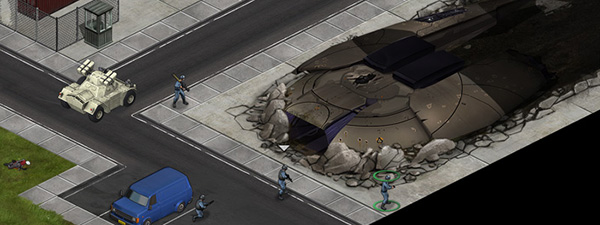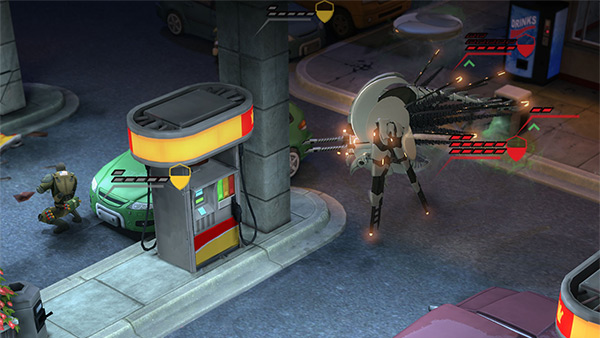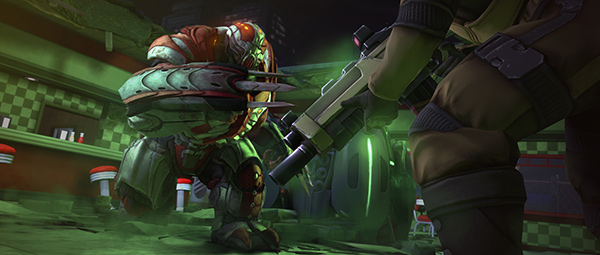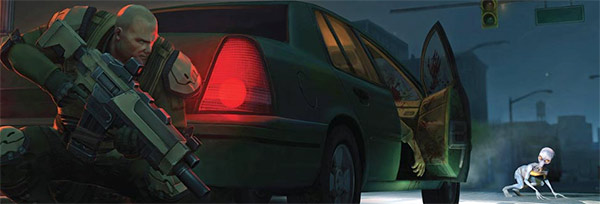Firaxis On XCOM vs Xenonauts & Optional Kill-Cam
Silence is golden
As promised yesterday, here's another chat with XCOM: Enemy Unknown lead dev Jake Solomon. Here it is - and it brings with it particularly glad tidings if, like me, you weren't 100% convinced the slo-motion 'glamcam' killshots and 80s action movie soldier vocals were for you. Turns out we will indeed be able to turn them off in favour of quieter, interruption-free strategising. I'll probably try it both ways (missus) to work out which I prefer in practice but I'm super-chuffed that we're getting the option.
Also discussed - what he thinks about indie X-COM remake Xenonauts, chat about how to capture live aliens, how alien interrogation and research works, more on the game's lethality, and to what extent the game will shape your advancement up the tech tree.
RPS: So, I have a question from someone you might have heard of. Are you aware of Xenonauts, your erstwhile rival?
Jake Solomon: They are not rivals! I consider them to be brothers in arms. I’m going to digress before you hit me, although if you call them rivals I’m a little afraid of what the question’s going to be. But, what I would say is that I am actually kind of excited for them because if there was any way, whoever is on that team over there, you tell them that we seriously need to sit down and have a beer some time because I can only imagine the stories that we could share about trying to make a game like this. I’m sure they’ve gone through a lot of the development headaches that we have as well. But yes, what is the question?
RPS: Right. Chris England, project lead on Xenonauts, asks ‘Why can’t you just die?’ No, no, actually his question was "I was wondering how they were going to keep things as lethal as it was before, where your troops are being mowed down left, right and centre?" So we know there's perma-death in there, but how often and how easily does it happen?
Jake Solomon: It depends. Let’s say you were to play classic difficulty. My goal with classic difficulty is to have an experience that’s not about winning the game. That’s what classic difficulty is. I’m not saying that people won’t win that difficulty level, I’m sure they will, but that’s not what I’m intending with it. I guess that what I’d say is that because I just finished the game last night, and I lost twenty-two soldiers, which is a significant amount, and again I went on a mission where I lost four out of my six, and one of those had already been on twenty missions.
You can go to the memorial wall where you can see all the guys who have died, and it tells you how many kills they had, how many missions they went on, what operation they died on. It’s actually pretty cool because we just put this in too, when you go to the memorial it’s sort of this UI screen and the camera’s looking at the bar, and as more guys die, you start to see these blurry pictures filling in on the wall behind the UI, and then there’s more and more shot glasses in front of the memorial.
RPS: ‘Oh god, what have I done’…
Jake Solomon: Exactly, and I don’t know why this is, but love going there. And the guy at the top is the guy who’s been with me on twenty missions, I think he was the captain or something like that. So yeah, lethality’s still there. It’s definitely from a design standpoint, it’s really, really tricky balance-wise because when you have six, losing one soldier is not quite a mission breaker, but at the beginning of the game when you have four, you lose one soldier and you’re now down twenty-five percent, if you lose two soldiers you’re down fifty per cent of your squad. That really turns the missions around.
I actually haven’t found that to be a negative; it’s the sort of thing where when you lose someone that’s been with you for a while you have the emotional resonance in that moment, but then also tactically, it really really ramps it up when all of a sudden your front line assault soldier keels over, and then you’ve got a bunch of wounded guys left and you know there are still other aliens out there, so…
At the late stage, if I play through and I just saw the bodies start racking up and I was like ‘oh this is good, I’m glad this is working the way I intended.’ A player does still lose units and they still lose very, very senior units, and you just can’t predict the battles. Things just go poorly sometimes and some guy takes two shots and maybe he had the best armour and he was racked up but he still was one of the guys who fell, and so I can promise that experience is still there in the game.
RPS: I wondered if maybe there was more of a focus, because you’ve got less guys in the field, on making sure they don’t get into harm’s way at all, and it gets a bit zero sum. If they do they’re basically dead, so the onus is on you to be thinking, planning all the time how you can stop them even getting into the line of fire.
Jake Solomon: It’s definitely true, and there’re some pretty punishing things. I actually just pumped up to the Beserker that we showed you recently. I actually just pumped him way up because he appears with Mutons, so design-wise I gave him a mountain of hit points, and he’s the inexorable death, right?, so he’s like marching towards you, and when he appears you’re like ‘Well, we’re ranged units, he has to get over here first, but if he does it’s the end of the line. If he gets in close he will kill anyone he gets close to.’
RPS: There’s a particularly horrible bone crunching noise if he does, as I recall from the demo.
Jake Solomon: Exactly. So what happens is that, when he appears, he is like a Terminator, so when you see him you completely change your tactics and you’re like ‘Everybody must put every round that they have in this guy’ because you can’t spread out too far. ‘We basically have one turn to take this guy out before he gets next to somebody because if he’s next to somebody, they’re going to die.’
Now that’s just a melee unit. Tactically, flanking is extremely valuable in XCOM so if you were to ever get flanked by an alien, that increases the damage that they’re going to do and so it’s the sort of thing where you really have to be careful when you don’t know where the aliens are, or when you do know where they are, you have to make sure positioning is really important. You don’t want to get in too close to the aliens because then it’s much easier for them to move around and get the flank on you. When they have the flank on you oftentimes it ends very, very poorly. And it is kinda nice because there aren’t a lot of cheap deaths, there are a lot of deaths but they aren’t cheap. It’s the sort of thing where it makes it easier as a player to say ‘Well, I’m not going to reload’ because you’re like ‘Ok, I knew, I moved there, I moved in too close, the guy was able to flank me’ or ‘I ran this person way ahead of the other guys, and with his last move he runs into this Cyberdisc.’ And you’re like ‘Well, it’s kinda fair when you do that, he doesn’t have support with him, that’s kinda how it goes’.
RPS: Rookie soldier, rookie mistake, eh? One thing I wasn’t personally quite so sure about in the stuff I saw was the glam cam, I know you guys really like that yourselves, and the soldier barks...
Jake Solomon: I was wondering when you were going to ask me about that. Yes? Now how did you put that: ‘there was something that I wasn’t quite as excited about’. I like that. What you’re asking me is ‘can I turn that off?’ Is that your question?
RPS: Heh, you've gazumped me. I’m fine with it being in there, I’d just like to have the option to turn it off if I want a quieter ‘I don’t want to be distracted, I just want to get my head down and solve this problem’ kind of session.
Jake Solomon: You have the option to turn that off. You also have the option to turn off soldier voices.
RPS: Hurray! Then everyone’s happy.
Jake Solomon: (laughs) I made sure and cleared that with Casey, my lead programmer. I was like ‘Look!’ I knew this was going to come up. ‘I’m talking to Rock, Paper, Shotgun this morning, can I tell them that we have the option to turn off action cam and turn off soldier voices?’ You can ask him, I told him that this was gonna come up. He said ‘Yes, you can tell them we have that option.’
Actually, let me tell you about something else we have. I played through the entire last game, we have an option in-game currently where you can hide enemy health and you can hide damage that you do, and that was something that people had brought up. In the original of course you had no idea how much damage you did, you had no idea how much health the enemies had and so we added that and that’s how I played this last game. It’s actually very different. You can’t say like ‘oh this guy can take this shot because he’s guaranteed to take out that alien there if he hits’, so it’s interesting. That’s also an option we’ve added is the option to turn off enemy health and any sort of damage tech so that the player can play a little bit more in the dark like the original.
RPS: That is a nice idea because it was like ‘If I’ve got this one shot, A: I’ve got to hit, B: it’s got to do enough damage, what the hell is going to happen?’ It’s proper scary so it’s nice to have that option.
Jake Solomon: And you do, you use one of your best soldiers and you’re like ‘Well…?’ You don’t know if you did a critical hit, which in the original game was just, the damage could do up to 200%, that’s sort of the same thing that we do but we just have a name for it. Without the damage, without the enemy health, you’re like ‘Ahhh.’ When you get to the really big aliens you’re like ‘I have no idea if that guy has three more turns in him, or if he’s about to fall over.’ So it actually creates these frustrating in a fun way moments where you’re like ‘do I really want to waste my sniper shot on this guy, or is it the sort of thing where I could pull out a pistol and do him in?’
RPS: Or you’ve only got one shot, you want to take out something that’s maybe smaller but you know it’s definitely going to fall over; at least there’ll be one thing off the battlefield instead of just one guy slightly eroded.
Jake Solomon: Right, that’s exactly right. It’s basically a question of ‘how much damage is coming into my guys' next turn?’ It’s a better chance to take out somebody who’s weaker but without the health up you’re kind of in the dark a little bit.
RPS: So if you do have that stuff on is it going to reflect what gear, what armour and weapons the aliens have got, or is it pretty much fixed per species?
Jake Solomon: No, actually some aliens at different points they will carry different weapons, so generally they stick to a particular class of weapons, but the Mutons in particular, they actually will change their weapons. That’s the sort of thing that you can either get by, you can look at them, I suppose you could zoom in and look at them, see what weapon it is, but also capture is a big part of the game as well, just like in the original, making sure to capture them.
I don’t know that I’ve ever talked about this before, but in our game the aliens don’t leave their weapons behind. When they die their weapons self-destruct but if you capture those aliens, then the weapons don’t self-destruct, and then you can research those. Not only is it critical to say ‘look, we want to know,’ you can find out a lot of things by having a friendly chat with these guys, but part of it is crucial to player progression, because if you really want to get your hands on some of the great weapons you’re going to have to send some poor bastard in at close range with what we call the Arc Thrower. I never liked the small stun launcher in the original, I always liked that real terrible moment of ‘get in there with the stun rod’ and that’s basically what we have, we call it the Arc Thrower but it’s basically ‘get in there and pray to God when you pull this thing out that the alien falls over’.
RPS: It was definitely some of the most dramatic moments, you’ve just got to walk right up to them, zap them with this little cattle prod and cross your fingers.
Jake Solomon: And we’ve tried to make that even more rewarding. It really is one of those moments that when you see it, you get jolted with the electricity, and tactically you want to wear them down first because the fewer hit points they have, the easier it is to stun them. If you’re facing off against a big old Muton, you’d be filling him full of holes, and then at some point you’d be like ‘Alright, I think it’s good, go in there and stun them now’. So the guy runs in there, pulls out the stun gun, uses it, and you’re just praying to God, because you’re an inch away from this guy, you’re praying to God that he falls over, but if he does, you’ve now captured his weapon, which is the only way that you can get those really, really awesome weapons. So it’s a big reward.
RPS: Sounds like catching Pokemon.
Jake Solomon: (laughs) It is a bit, they’re turn-based, it’s the same thing. Basically the same thing. We’re going to be huge in Japan.
RPS: Has there been balancing stuff in terms of restricting or delaying access to research-critical stuff like the Arc Thrower? In the original, it takes a while before you’ve got all the kit and facilities you need to actually capture an alien, so you can’t go and immediately capture a lot of stuff and maybe have a big advantage quite early.
Jake Solomon: Well, it’s the sort of thing where I don’t want to control that too much, I mean we thought about that, we thought about, balance-wise, should we hide the alien weapons in the tech tree to where it’s like ‘well, you kind of need to look into how the aliens generate power first’ and then we thought ‘that’s not fun.’ You have to gate it a little bit because you don’t want the experience to be ruined, but first you have to build the Arc Thrower, you have to build the alien containment facility, so that’s actually also a fun thing too.
In your base, whoever it is you brought back last, you can actually go down there and look at them and there’s your scientists kind of standing around, looking at the alien containers and taking notes, and there’s this big Beserker behind the glass pounding on the window.
RPS: 'Press ‘X’ to waterboard?'
Jake Solomon: Right. Then there’s a Quicktime Event to interrogate them. No, I’m just kidding. I’m kidding! That was a joke.
RPS: I’ve got my headline! Brilliant!
Jake Solomon: (laughs) Quicktime revenge. We wanted to make it more modern. There’s a Facebook Quicktime online component…
No, the idea is that in order to research that, before you’ve researched any advance weapons, if you wanted to, the minute you bring back let’s say, one of those alien weapons, you could research that. You’re going to have to have resources, our research tree requires not only do you have to have the item itself but you’re going to have to have some resources that go into the research. So it would be gated a little bit by that, but you could do it fairly early, and you could bypass other types of weapons if you wanted to jump into alien weapons. You could do that, but that’s a major cost because they take a long time to research.
So unless you really blitz the research in terms of depending on what continent you start on, what rewards you go for, you could get a lot of scientists early. It’s just like anything; if you do that, you’ve given up engineers, you’ve given up cash, and so you could get alien weapons early. That’s the kind of stuff that as a designer I’m so excited to see, somebody’s going to be like ‘Here it is, this is the shortcut, it breaks the game, you can do this, this and this…'
RPS: The XCOM speed run is probably inevitable.
Jake Solomon: But I’d rather have more open systems, which isn’t to say that there aren’t some gating mechanics in the game, but I think you get into trouble in a game like XCOM and strategy games in general if you try and gate the experience too much. If you try to craft the experience too much, one: it doesn’t feel re-playable and two: as a player it just feels fake. If the rewards are too metered it feels like you don’t have the freedom to craft your own experience. So we decided to leave them like the instant you capture an alien and their weapon you could start in on that.
RPS: In terms of research, is it a fixed linear tech tree , or branching? You could have gone down human or you could have gone down alien, say.
Jake Solomon: No, it’s a big, big tree and what we’ve tried to do is also, speaking about interrogations, in the original there wasn’t as much value sometimes in autopsies and interrogations. They were awesome narratively, but there were techs that actually wouldn’t grant anything, and so one thing we did was we made sure that every tech grants something. It has to grant something.
The way that actually works, there is something like that, but we have the actual alien tech, and that’s what your scientists work on. In addition to that, there’s a facility called the Foundry, which is almost like an engineering tech tree, and so when you build that, that’s how the player builds SHIVS, which are the tanks in our game, and that’s sort of like an engineering focused thing like ‘Oh, here’s improved pistols’ or ‘Here’s the different types of SHIVS’ and here’s all these things, and so that is in essence a tech tree.
And then of course you have the Ops which is almost like a soldier tech tree, but it’s pretty flat, I don’t want to misrepresent it, it’s more like upgrades for your soldiers. And so we have these different facilities, one: you have to build the facility, and then two: you’re never going to be able to do everything unless you just really stretch out the game. So it’s the sort of thing where on my last game, I wanted to, I set out being like ‘Oh, I’m going to do a bunch of engineering stuff, I’m going to build a bunch of tanks.’ I just never got around to it, just because resource-wise I didn’t spend it on all the tank upgrades.
So the science tech tree branches in all kinds of different directions, but at the end of the day you could conceivably map out the entire tech tree if you really took a long time. And based on what bonuses you got, you could conceivably do the entire tech tree. So it’s not an either/or thing, but then when it comes to the Foundry and the tech tree, you have to make choices about what you want to spend your resources on.
RPS: Ok. So you're expecting people to replay it then?
Jake Solomon: Oh yeah.
RPS: Thanks for your time. Again.























